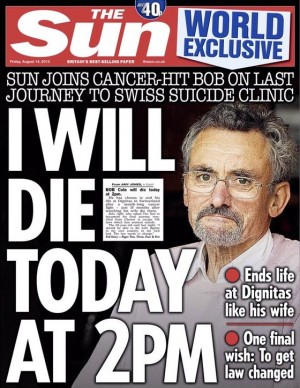
A man suffering from terminal cancer has called for a change to UK law on assisted dying, just hours before he is due to end his own life at the Dignitas clinic in Switzerland. Bob Cole, 68, was diagnosed with mesothelioma, an aggressive form of lung cancer, a month ago, leaving him facing a distressing and painful death. He has told The Sun, which is documenting his final hours and joining Cole in calling for change to the law on assisted dying, that he has ‘no wish to die in pain without any dignity’. The British Humanist Association (BHA) has backed his call.
His decision to end his own life at 14:00 today comes only 18 months after watching wife, Ann Hall, undertake the very same journey and end her life at Dignitas rather than suffer a cruel and degenerative death as a result of progressive supranuclear palsy, a fatal brain disease. Despite speaking very highly of the care given to his wife in at the time of her death, Cole has made it clear that the journey to Switzerland is one borne of necessity rather than choice, saying ‘I should be able to die with dignity in my own country, in my own bed. The law needs to change.’
Speaking within hours of the end of his life, Cole said, ‘everyone should be allowed the choice to die with dignity, which is exactly what Ann chose to do – and is exactly what I will do today.’ Cole strongly urged MPs to back Rob Marris’s private members’ bill to relax the law on assisted dying, which is due to be debated next month. ‘The politicians need to have the guts to change this law. Just bite the bullet. Accept that the British public want this change. If they don’t it will be forced upon them because the public feeling is overwhelming’.
The BHA has long campaigned for the right to die for both terminally ill and incurably suffering people who have made a rational and uncoerced decision to end their life, a policy backed by around 80% of the population. The campaign for assisted dying has even found an unlikely but welcome ally in the former Archbishop of Canterbury, Lord Carey, who said this week that introducing the right to die for the terminally ill would be a ‘profoundly Christian and moral thing’ to do.
Despite the broad coalition of support for the change, as well as a multitude of tragic cases such as Cole’s, political action on the issue has often been characterised by its distance from public opinion. An Assisted Dying Bill was introduced by Lord Falconer in 2014, but its progress was hampered by the Government’s refusal to give it sufficient time for consideration. In Scotland, legislation on assisted dying was recently rejected by the Scottish parliament.
Speaking to Cole’s case, BHA Campaigns Manager Richy Thompson said, ‘Bob Cole has given a moving account of the tragic choice faced by far too many in the UK: either suffer a cruel and painful death not of their choosing or travel abroad where the law affords them the autonomy and compassion they deserve. The vast majority of the public will sympathise greatly with Bob and his wife Ann, and support his impassioned plea for a change to the law. Where individuals are of sound mind but terminally ill or incurably suffering, offering them the option to have assistance to end their lives is the only compassionate choice, provided that it is their settled and uncoerced wish.
‘It is past time that parliament or the courts recognise and rectify the fact that those who are terminally ill or suffering are not afforded the right to choose the manner and timing of their own death, despite overwhelming public support for the change.’
Notes
For further comment or information contact Richy Thompson, BHA Campaigns Manager, at richy@humanists.uk or on 020 7324 3072.
Read more about the BHA’s campaigns work on assisted dying: http://humanists.uk/campaigns/public-ethical-issues/assisted-dying/
The British Humanist Association is the national charity working on behalf of non-religious people who seek to live ethical and fulfilling lives on the basis of reason and humanity. It promotes a secular state and equal treatment in law and policy of everyone, regardless of religion or belief.
